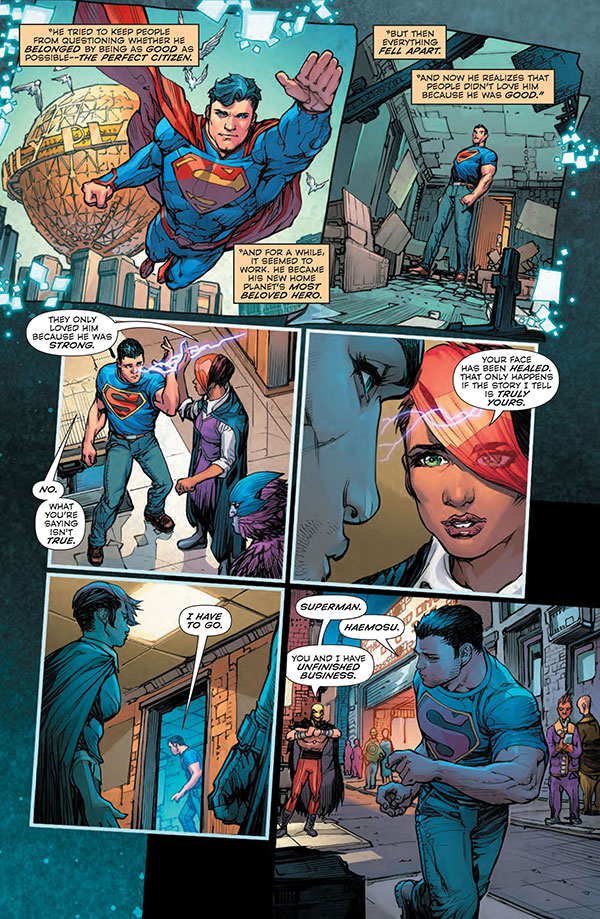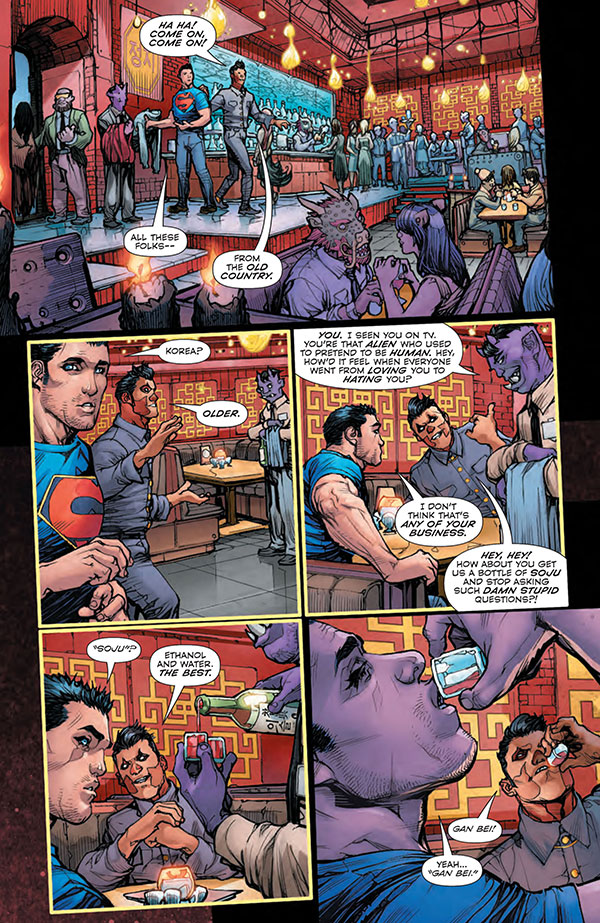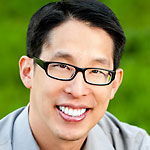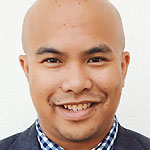
Award-winning graphic novelist Gene Luen Yang tells the story of how Asian American culture and immigration experiences influenced his latest project — Superman.
Superman wasn’t always the archetypal defender of "truth, justice, and the American way" when Superman creators Jerry Siegel and Joe Shuster first introduced him in Action Comics #1 in 1938.
In the past 78 years, writers have used Superman primarily as a tool for American propaganda as they added to his powers and legend through radio and comic books. By the 1970s, writers had created a popular Superman who was an invincible muscular powerhouse — interestingly, while America was asserting its own dominance as a world power.
Movie adaptions allowed writers to give Superman more dimension as a character. During the post-Vietnam War era of the late '70s and ongoing Cold War era of the '80s, director Richard Donner's series sought to humanize the titular character featuring actor Christopher Reeve. Reeve's Superman wrestled with the theme of self-sacrifice, and the ability to be a bridge for world peace during a time when many Americans desired peace and for the Berlin Wall to come down.
In 2006, director Bryan Singer's "Superman Returns" marked the first Superman film to be created post-9/11. In the context of a self-professing evangelical Christian sitting as president, a growing conflict against radical Islam, and a mission against terrorism, Singer seemed to implant Christian symbolism into many of his scenes. Superman took on a Christ-likeness, a savior against the terrorism of Lex Luthor, Superman's ultimate archenemy.
Ten years later, this Superman savior complex is expanded in director Zack Snyder's "Man of Steel" and "Batman v Superman: Dawn of Justice". Snyder explicitly depicts Superman as a god. But Superman's godlike power has devastating consequences, including the leveling of cities and the loss of innocent lives.
• • •
Despite the numerous comic books, 10 movies, and multiple iterations, many writers and readers have often overlooked Superman the immigrant — a complex, multi-dimensional character who struggles with identity and feelings of alienation.
Last year, DC Comics hired Eisner Award-winning graphic novelist Gene Luen Yang to pen a story arc for Superman that first unfolded in "Superman Vol. 3 Issue #41" and will continue to "Issue #50".
Gene is a captivating storyteller whose original work is filled with depth and humor. He is known to write on themes of social injustices, conflicts with identity and culture, and even elements of faith — all largely influenced by his own upbringing as a Chinese American growing up in the Bay Area of Northern California.
Similarly, Gene believes that the personal stories and lives of Siegel and Shuster themselves are embedded in Superman — both original creators were children of Jewish immigrants. Although Gene wasn't conscious of this fact growing up, he was always drawn to the fact that Superman was an immigrant.
"Children of immigrants have two different identities," Gene says. "A lot of us grew up with one name at home, one at school. We speak one language at home, and one at school. We live under a set of expectations at home, and another set at school."

Anyone familiar with the Superman mythos can relate to Gene's comparisons. Superman's Kryptonian name is Kal-El, while his adopted American name is Clark Kent. These two names and identities are always kept separate.
"As we get older," Gene continues, "we have to figure out how to integrate these different [identities] together. The convention of secret identities within the superhero genre really reflects that. By taking away that secret identity, you have to integrate those things into a cohesive hold."
Not only is Superman an immigrant, more specifically, he is a refugee, one forced to leave his country because of war, persecution, or natural disasters. Superman's cultural narrative starts with him as a baby on the planet Krypton, where his parents send him to Earth not just to escape the planet's destruction, but to offer him a chance at a better life.
Gene came to the "Superman" series at the most opportune time, succeeding Geoff Johns and John Romita Jr. as writer. In "Superman #38", Johns gives Superman a new power: the solar flare. This power allows Superman to expel all his solar energy stored in his cells in one dangerous blast, akin to a nuclear bomb.
The downside of using up such power is that it leaves him temporarily vulnerable and without powers. From a storytelling standpoint, the time period Superman needs to recover gives Gene the prospect of exploring who Superman is at his core. With powers stripped away, Superman is simply human, someone who experiences fear, sadness, anger, happiness, hopes, and dreams.
• • •
In one plot line, Gene utilizes Clark's alter ego as a journalist to track down the identity of Superman's latest villain, hacker Hordr_Root. Clark's investigation leads him to Oakland, CA, where he finds himself joining a dueling arena called MythBrawl.
In real life, Gene taught computer science at a high school in Oakland and wanted to write something unique to his area. He was inspired from watching Hood Slam, a theatrical amateur wrestling league. Gene says, "[Hood Slam] embodied Oakland in this awesome way — they're artistic and outside of the box. I've watched a lot of them on YouTube. So I wanted to have a wrestling league like that and have all the members in the wrestling league from near-forgotten mythologies."
On the surface, an underground fight club might not seem exciting, but Gene creates a twist. "If we don't tell our own stories, the stories of our culture, we forget who we are."
In the DC Comics Universe, these gods of mythologies are only as immortal as the stories people remember. Thus, MythBrawl actually helps these fallen and forgotten gods on the verge of extinction maintain their lives — through the retelling of their legends in a wrestling arena in front of a live audience.

Through MythBrawl, Gene provides a subtle commentary on the lack of Asian representation in comic books, and creatively introduces comic book fans to Korean, Japanese, Chinese, and Filipino mythologies through characters like Apolaki, Mayari, Haemosu, and Kitsune.
Gene says, "I think the gods from European mythologies have always been in American comics: Thor over at Marvel, and the entire Greek pantheon of gods in DC. I wanted to bring in gods of color."
Like the gods of MythBrawl, Clark, in many ways, is a fallen god. The only remnant of his former glory is the "S" on his T-shirt. Gene provides audiences with a very rare glimpse of how far Superman has fallen. With his secret identity made public, no one wants to work with Clark. He becomes financially destitute and spends his last 20 bucks on food because he's hungry.
What would someone of Superman's talents do for money? What would anyone do when no one is willing to give them a chance? In a humanizing scene, Gene shows Clark taking the offer of receiving $500 a match to participate in the extravagant wrestling show with the other "gods of color".
It seems unsettling to see someone so great do something that seems beneath him. Yet, such a scene may resonate with immigrants who were successful in their country of origin, but chose to come to the U.S. for the American Dream of greater success — only to find themselves scarcely making ends meet. Compared to their European counterparts, these ethnic gods are barely making it. But at least in MythBrawl, they get to be in the spotlight and are in control of telling their story.
In MythBrawl, Gene not only has the opportunity to have Superman interact with people of color and empathize with their sense of desperation, but he also emphasizes the need for celebration.
In one scene, Superman's MythBrawl co-star, the Korean god Haemosu, invites him to a night out. They've been working tirelessly, so Haemosu takes Superman to an underground nightclub and, for the first time in comic book history, Superman drinks soju. "I wanted him to try it, because it's such a part of Korean culture and he's hanging out with a Korean god. So I wanted him to try it, but not get drunk."
• • •
Maybe it takes people like you and me to retell our origin stories to breathe new life and meaning into America's own familiar yet forgotten story, a nation that welcomed the "tired, poor, and huddled masses yearning to breathe free". Maybe in retelling this story, we won't need a superhero flying around in tights to show us the way.
Want to learn more about Gene? Check out his podcast interview with Ken Fong at asianamericapodcast.com.

Gene Luen Yang is the National Ambassador for Young People’s Literature. “American Born Chinese”, his first graphic novel from First Second Books, was a National Book Award Finalist, as well as the winner of the Printz Award and an Eisner Award. He has written for the hit comics “Avatar: The Last Airbender” and “Superman”. Gene lives in the San Francisco Bay Area.
